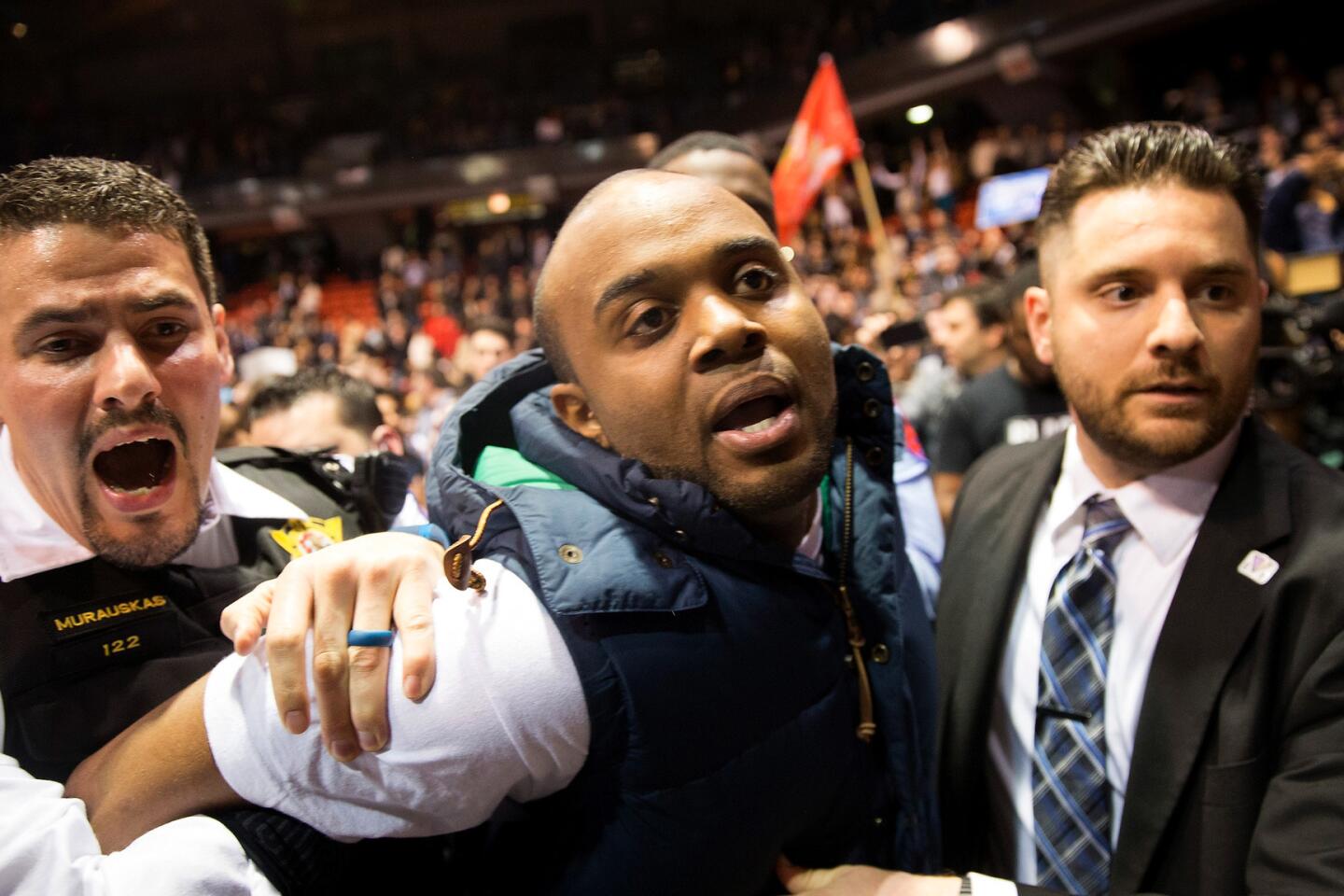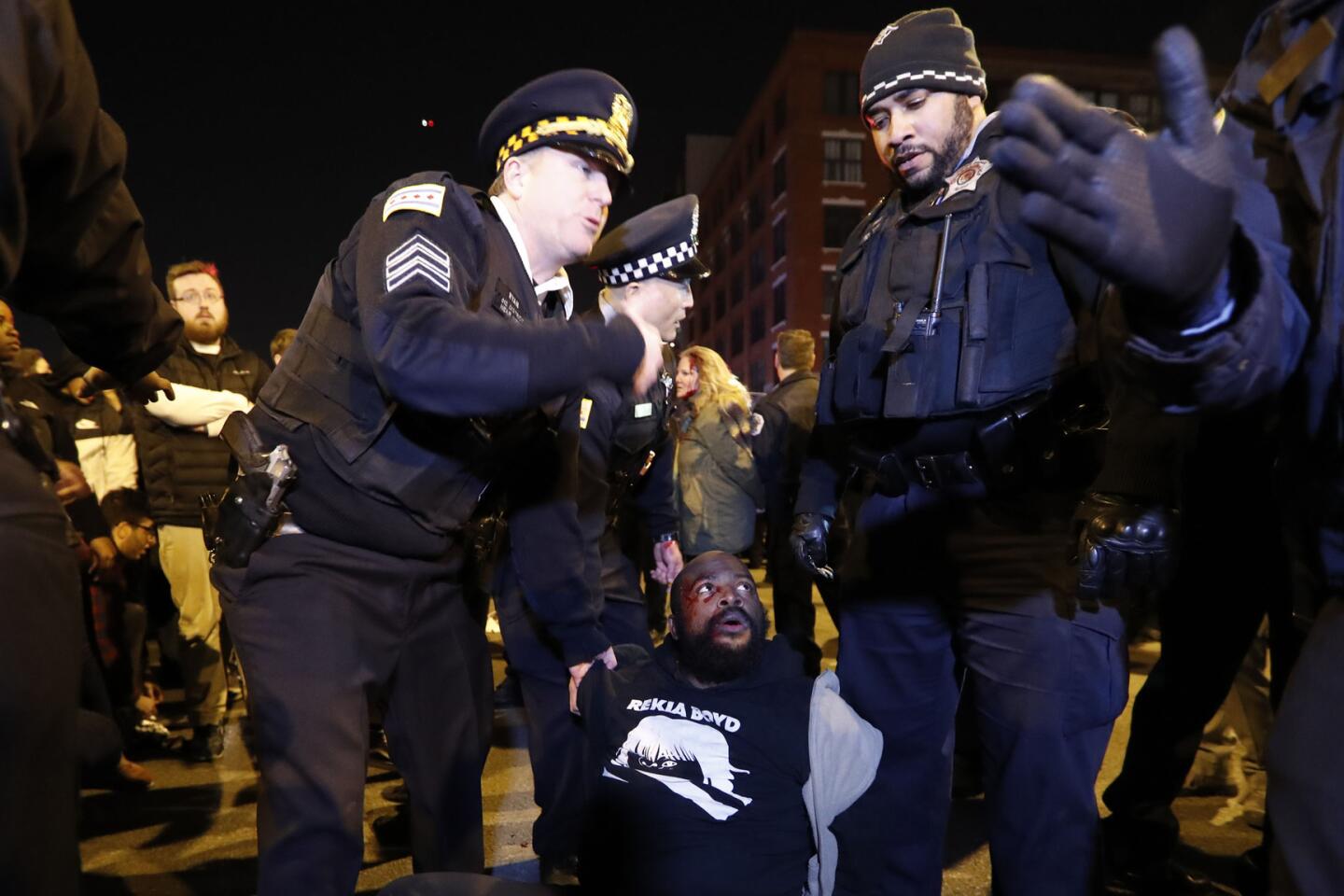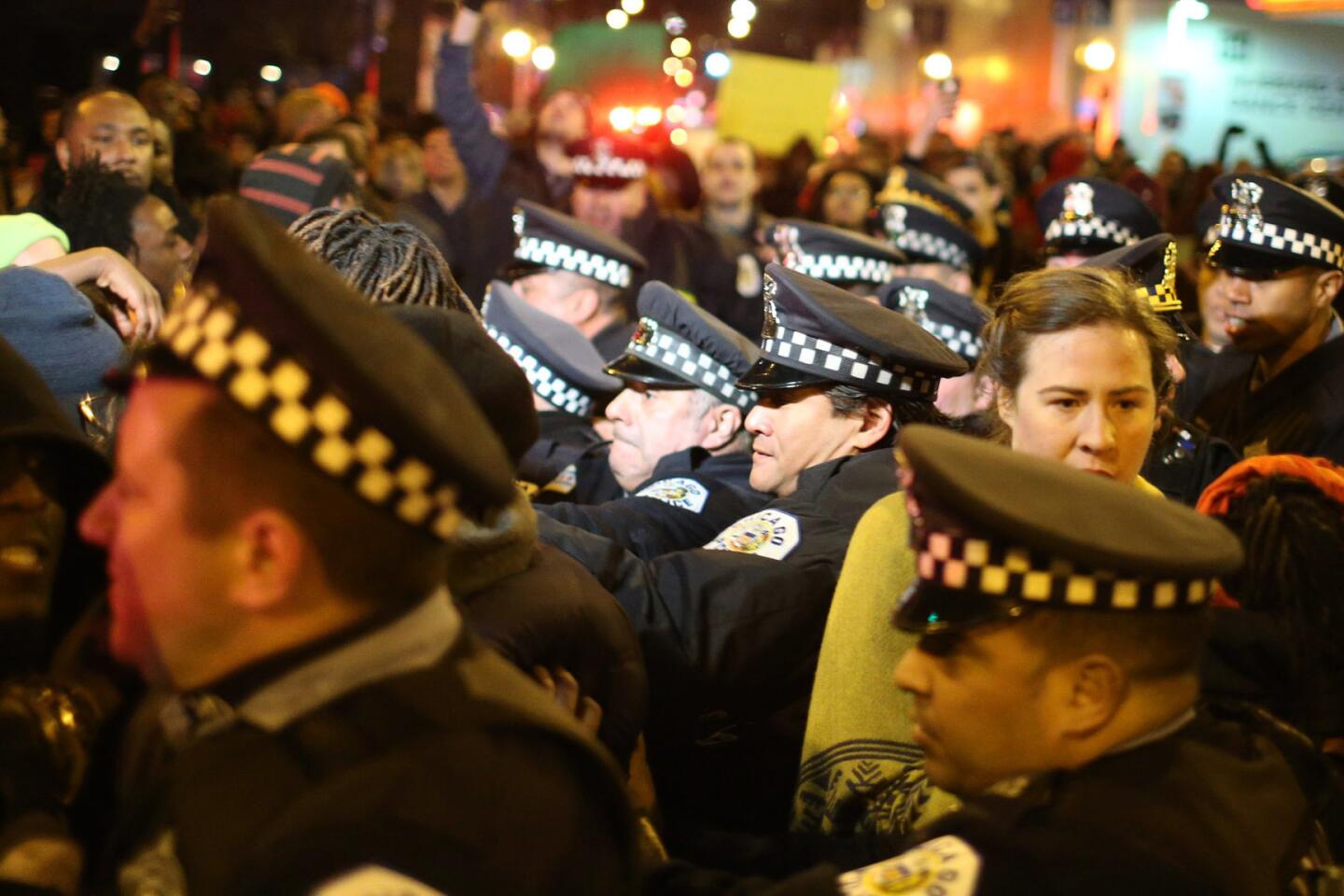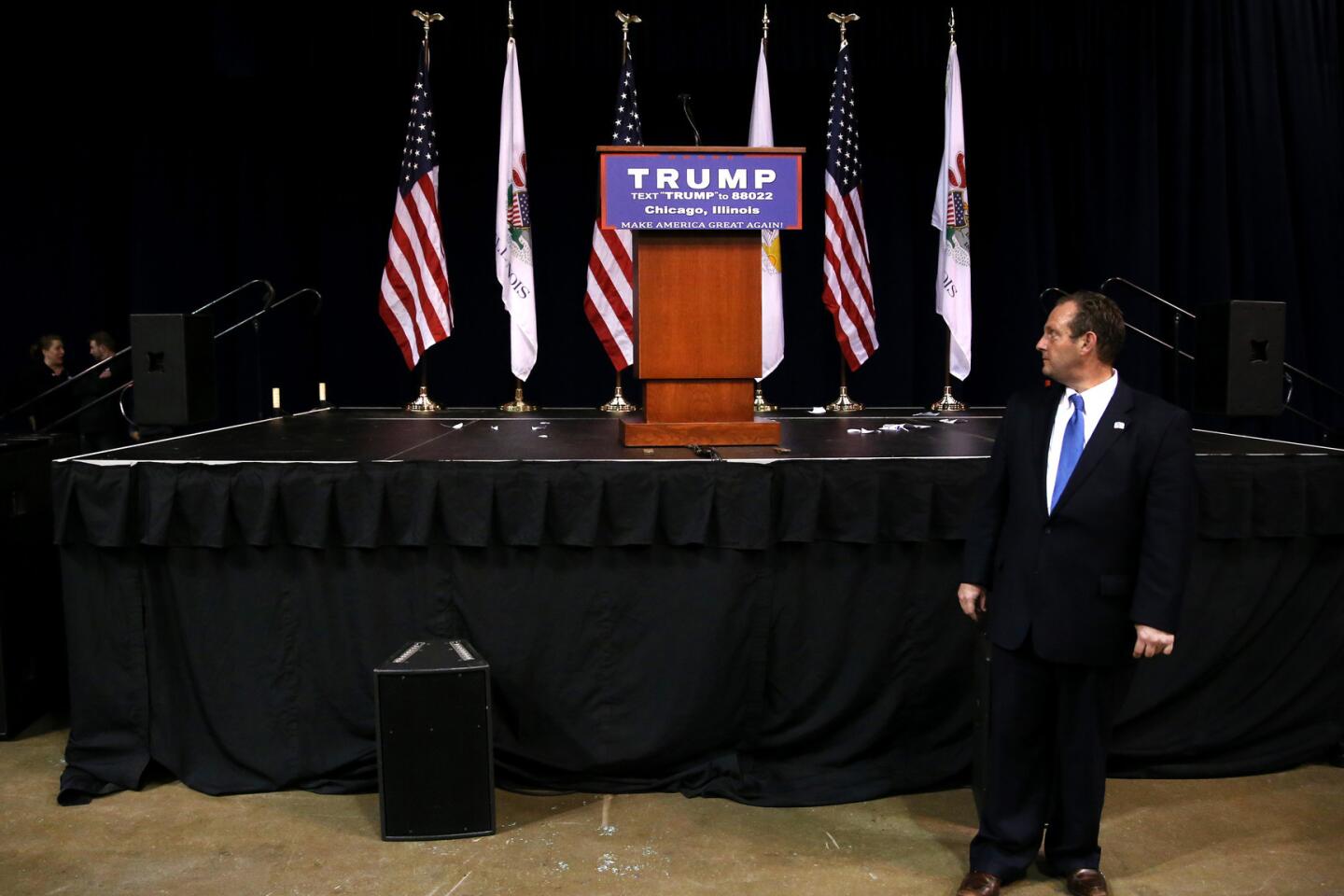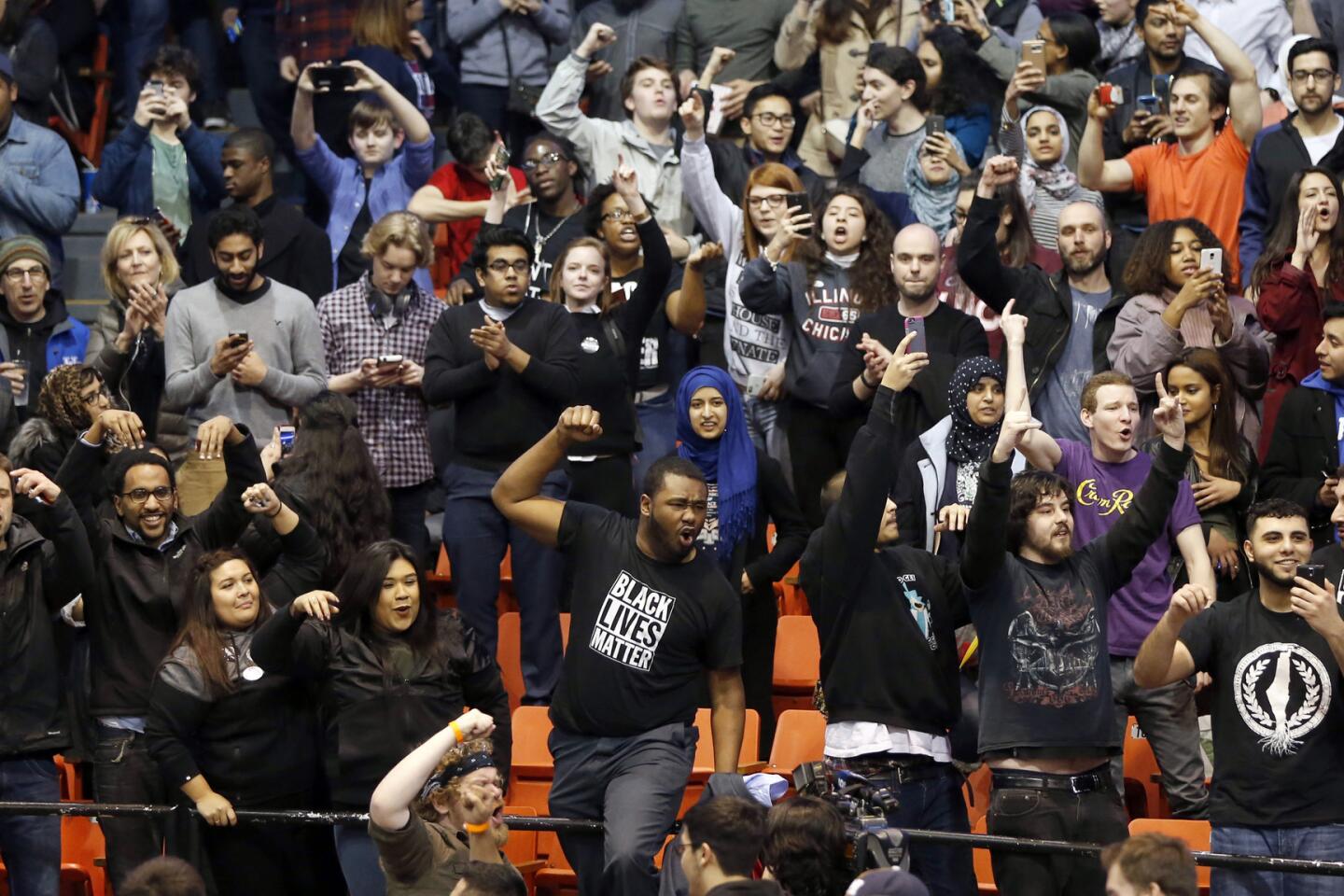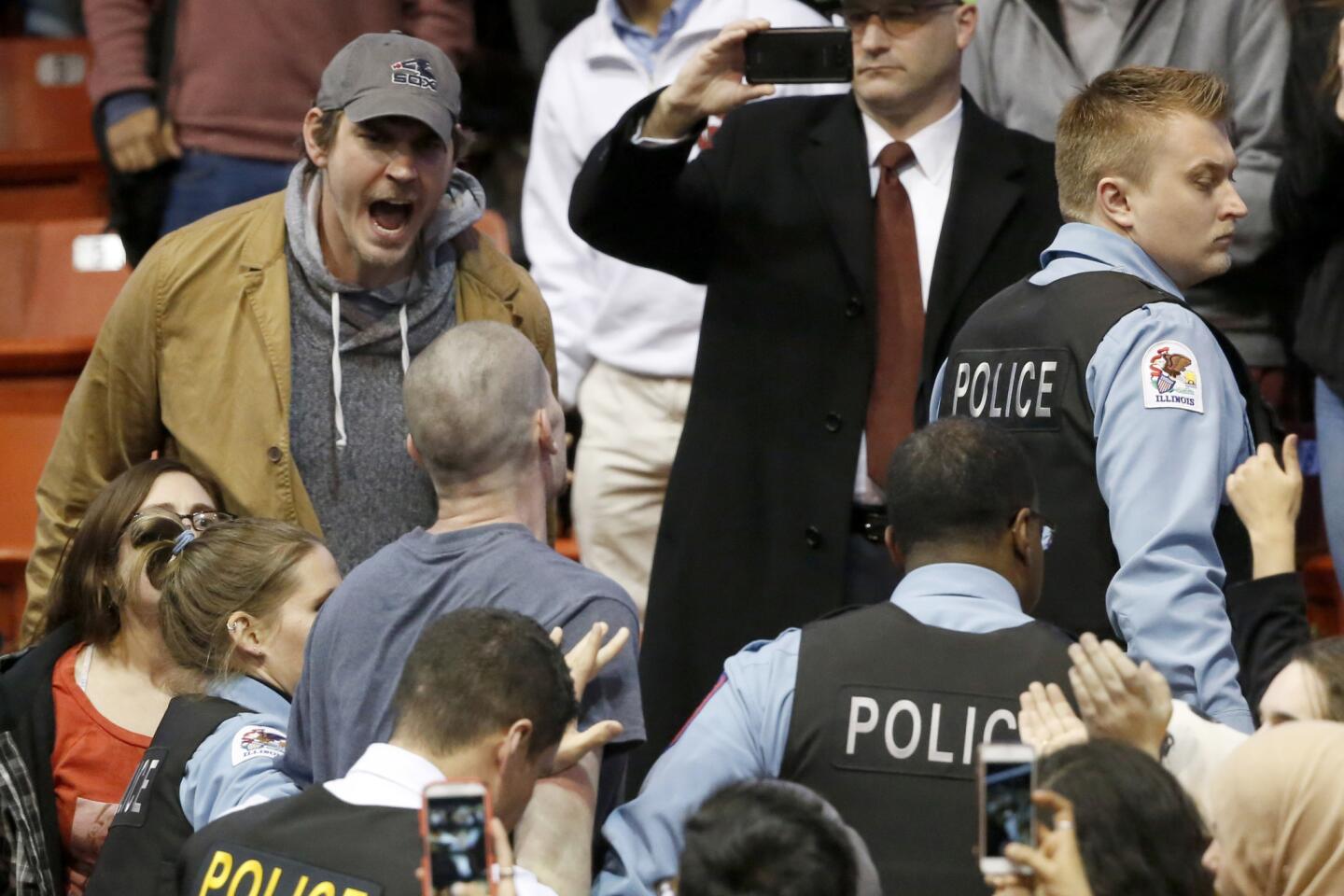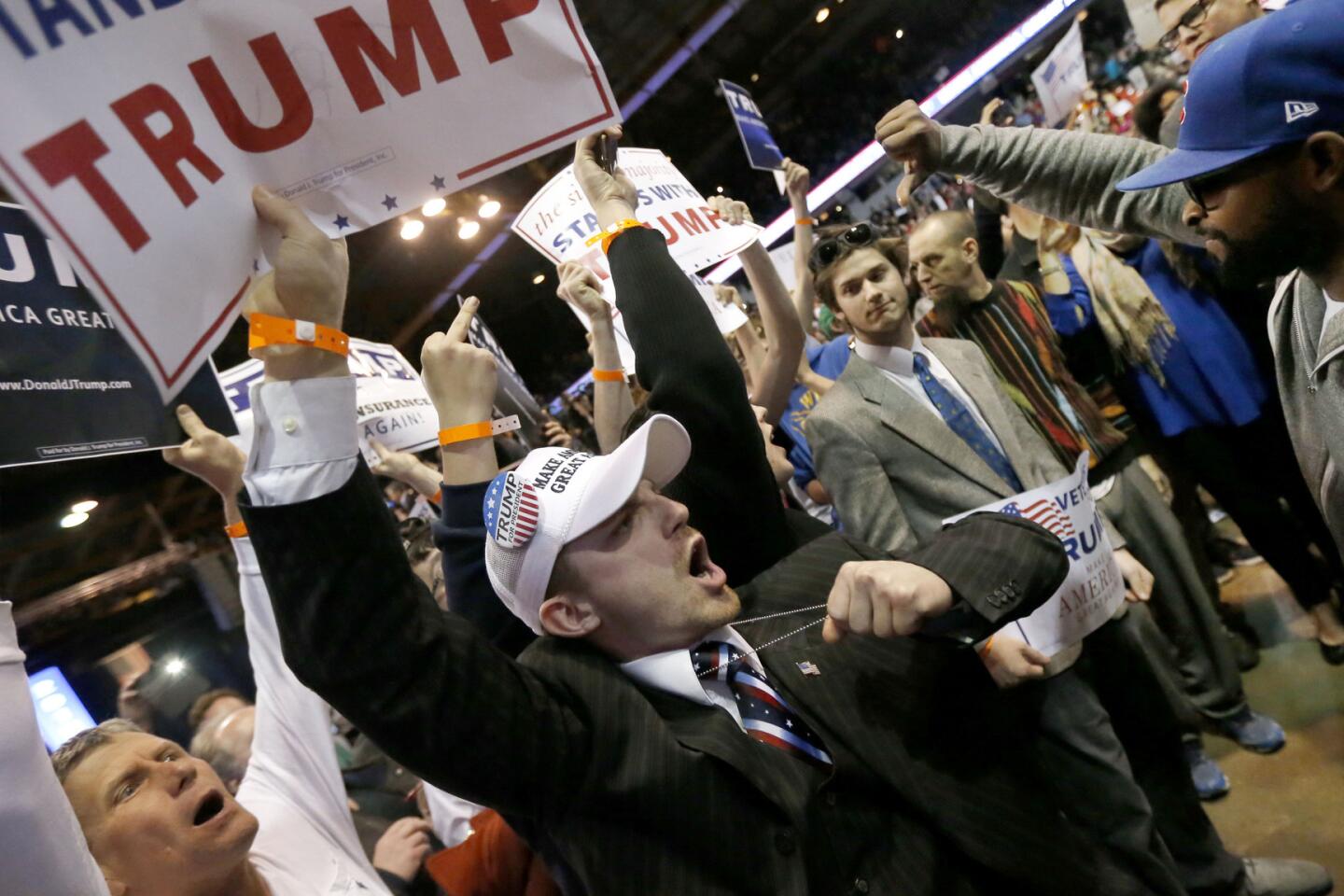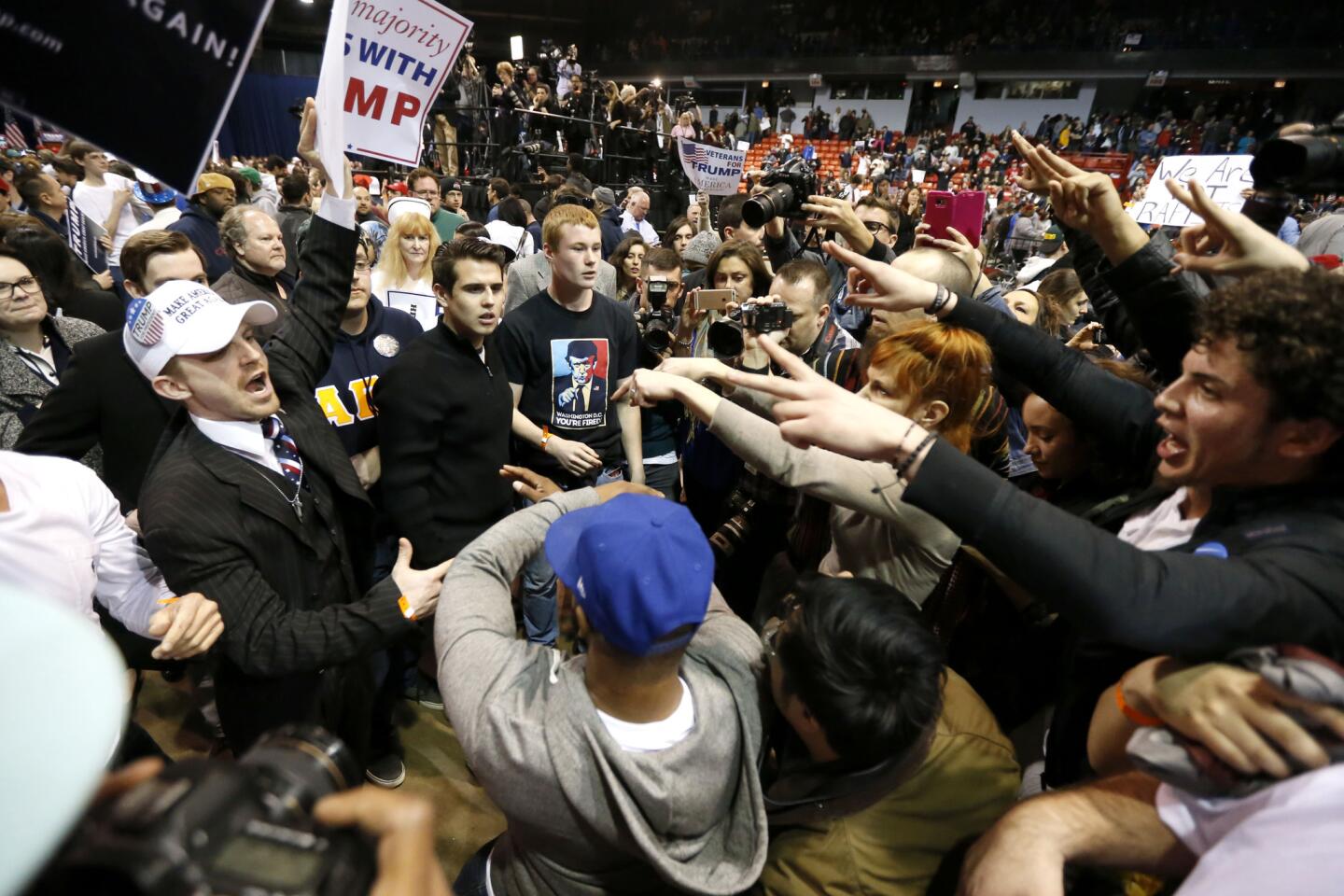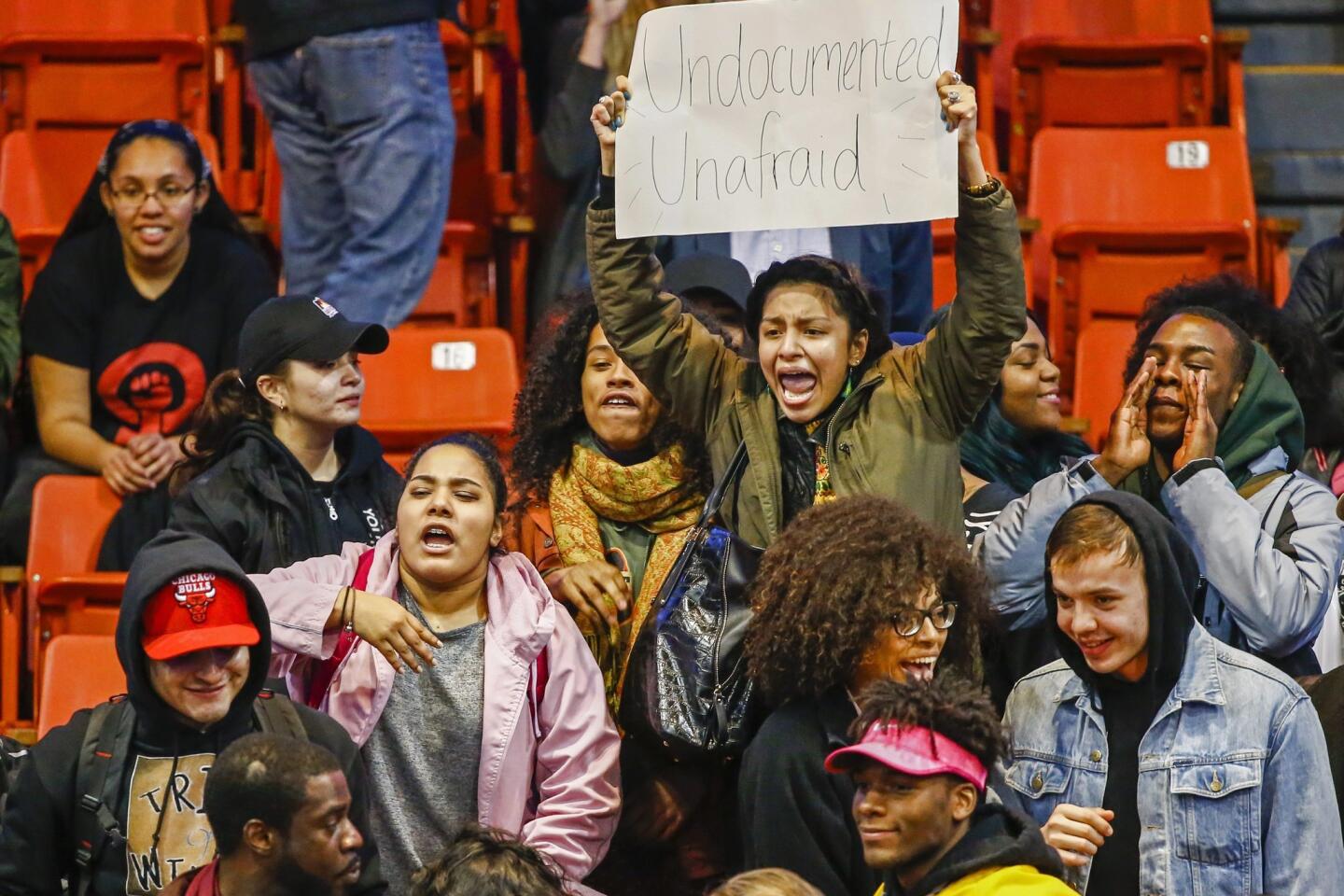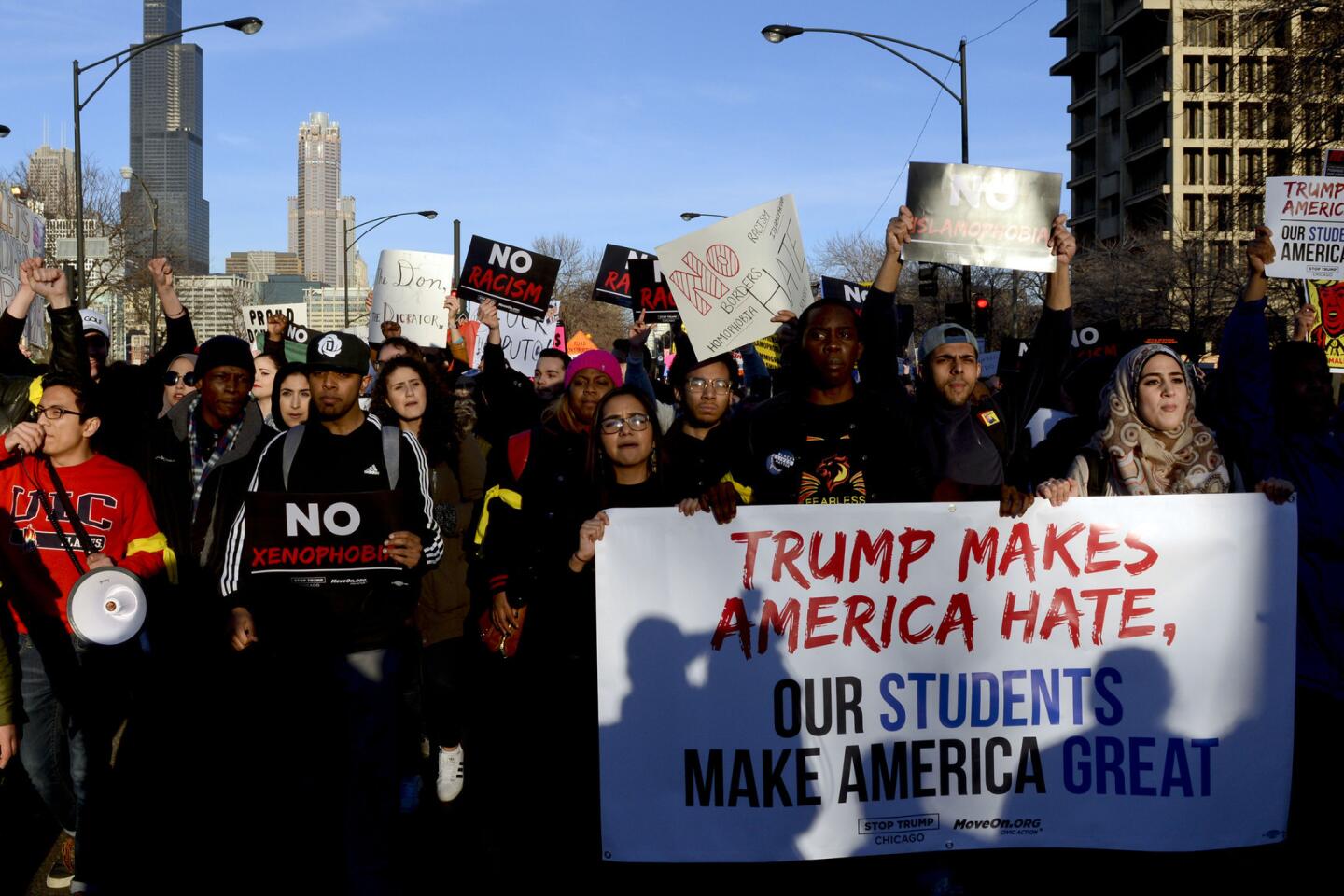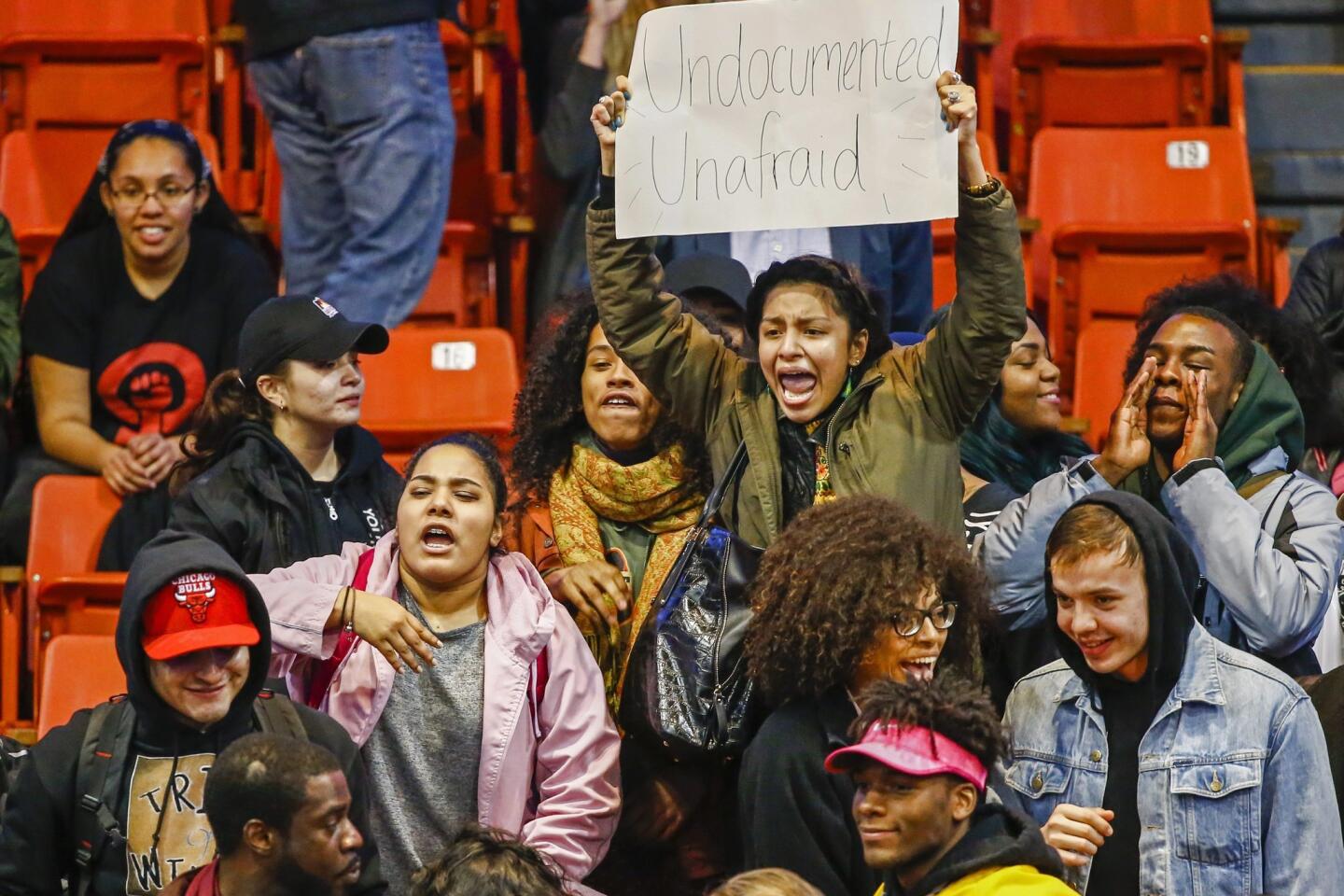Trump’s endorsement of violence reaches new level: He may pay legal fees for assault suspect
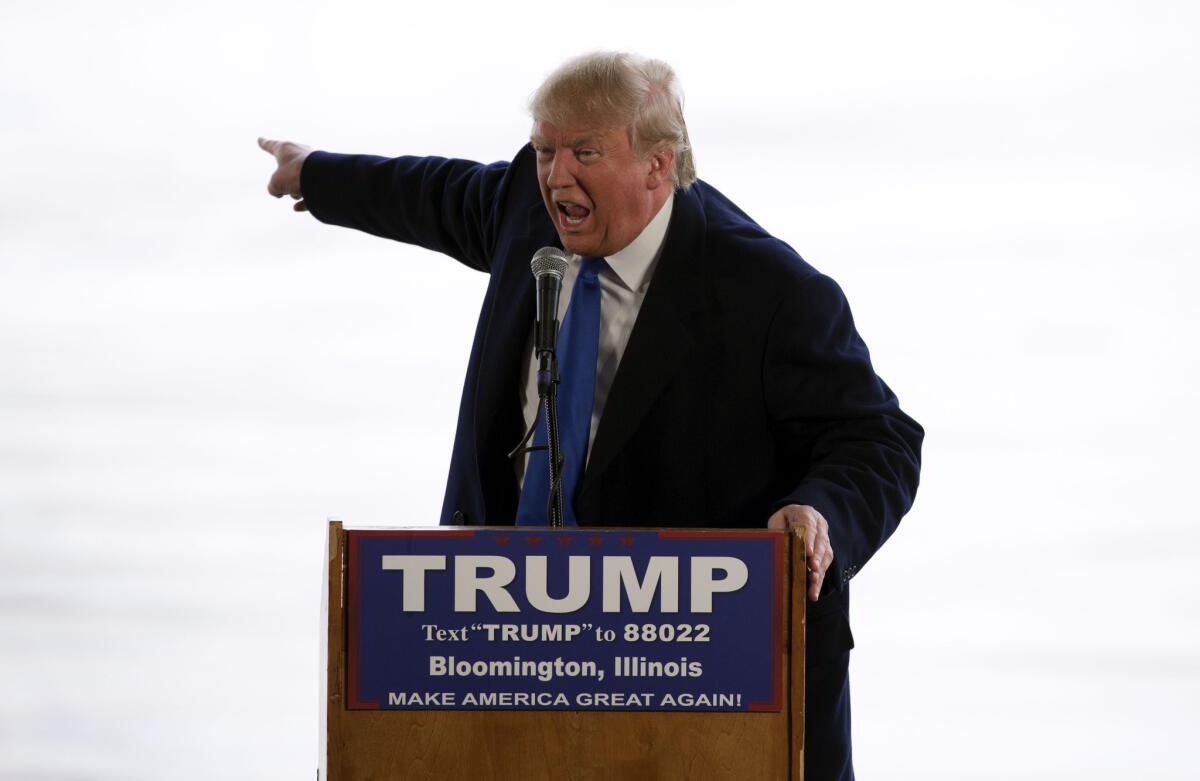
Republican presidential candidate Donald Trump speaks at a rally in Bloomington, Ill., on March 13.
- Share via
Reporting from BOCA RATON, Fla. — When Donald Trump said Sunday that he might pay the legal fees of a man charged with hitting a protester in the face at one of his rallies, it was the latest of many occasions when the leading Republican candidate for president appeared to condone or accept violence by supporters.
Heckling at rallies is a staple of all presidential campaigns, and the New York billionaire attracts more than average. For both Democrats and Republicans, it’s routine to urge unruly crowds to remain peaceful, as Trump often does.
Election 2016 | Live coverage on Trail Guide | March 8 election results | Track the delegate race | Sign up for the newsletter
But Trump alone has openly endorsed violent retaliation against people who disrupt his rallies, many of whom accuse him of racism.
The racially charged mayhem that erupted at his planned rally in Chicago on Friday night, with black and Latino protesters and white Trump supporters taking swings at one another on live television, did nothing to temper what critics in both parties have labeled his dangerous rhetoric.
At a rally Sunday in Bloomington, Ill., Trump lashed out at the media, accusing journalists of giving outsize coverage to the violent aspects of his campaign.
“Guess what happened?” Trump said as he criticized an allegedly violent heckler. “Our people started swinging back.”
Trump repeatedly returned to that theme, talking about violence or threats of it at his events as both overhyped and, at the same time, justified.
“Sometimes we talk a little bit tough,” he said. “When I see somebody out swinging his fists, I say, ‘Get ’em the hell out of here.’ We’re a little rough.”
Journalists “hate to hear that,” he said. “‘Why did you act so viciously toward that young person that was really protesting?’ See he wasn’t protesting. He was swinging. He was vicious. And you know what? They took him out. That was OK that day.”
Trump did not specify which incident he was referring to, but he appeared to be talking about an assault in the audience during his rally Wednesday in Fayetteville, N.C. Police were ejecting a black protester, whom multiple videos show to have been loud but nonviolent, when a 78-year-old white man, John McGraw of Linden, N.C., hit the protester in the face.
McGraw, who was arrested the next day on suspicion of assault and disorderly conduct, told “Inside Edition” on his way out of the rally: “Next time we see him, we might have to kill him.”
On NBC’s “Meet the Press” on Sunday, Trump was asked whether he would pay McGraw’s legal fees, as he once offered to do for supporters who rough up protesters.
“I’ve actually instructed my people to look into it, yes,” Trump responded.
In several television interviews Sunday, Trump denied condoning violence.
But at a rally with Sarah Palin last month in Cedar Rapids, Iowa, Trump encouraged a few thousand supporters to beat up anyone who hurled a tomato at him, saying security had warned him that might happen.
“If you see somebody getting ready to throw a tomato, knock the crap out of them, would you?” Trump said, drawing cheers and laughter. “Seriously, OK? Just knock the hell — I promise you, I will pay for the legal fees. I promise. I promise. They won’t be so much, because the courts agree with us too — what’s going on in this country.”
On Sunday, he defended the remarks in the NBC interview.
“If you get hit in the face with a tomato, let me tell you, with somebody with a strong arm, at least, let me tell you, it can be very damaging,” he said.
For months, Trump has used protester disruptions as a theatrical device at rallies across the nation, enlivening his events with conflict.
“Get ’em out,” he often shouts. “Get ’em out. Come on. Let’s go. Get ’em out.”
Trump encourages crowds to surround and shout down protesters with chants of “USA.” In a riff on how sleazy and dishonest he finds reporters, Trump frequently tells his audiences that TV cameras never show how big his crowds are unless hecklers interrupt him, triggering a roar of catcalls toward the media pen.
“Unless we have a protester the cameras are never going to show the crowd.... Is there a disrupter in the house?” he said at a rally here in Florida on Sunday.
Taunting demonstrators whose shouting interrupted him at a rally in St. Louis on Friday, Trump snapped, “Go home and get a job. Go home to mommy.”
At a casino rally in Las Vegas last month, Trump pined for “the old days” when demonstrators would be “carried out on a stretcher, folks.”
Although he sometimes urges crowds to be gentle with those getting kicked out of his rallies, he often does not.
“I’d like to punch him in the face,” he told the Las Vegas crowd when one protester was ejected.
On Sunday, Trump accused Democratic presidential candidate Bernie Sanders of riling up protesters. At the rally in central Illinois, he threatened to send his own supporters to disrupt the Vermont senator’s rallies in retaliation.
Sanders denied directing supporters to disrupt Trump rallies, and no evidence has suggested otherwise.
“A candidate for president of the United States should condemn violence, not encourage violence,” Sanders told supporters at a rally Sunday at Ohio State University in Columbus. “You don’t go around saying it’s OK to beat people up and ‘I’ll pay the legal fees.’”
People have a right to protest, Sanders added during a televised town hall on CNN, but “that is very different from getting involved in violence.”
Trump’s statement on possibly paying McGraw’s legal bills also drew the condemnation of Marco Rubio, one of Trump’s Republican rivals.
Campaigning outside Orlando, Fla., at the Villages, a sprawling retirement community, the Florida senator faulted Trump for “telling people in his audience, ‘Go ahead and punch someone in the face and I’ll pay your legal bills.’ That’s not an excusable attitude.”
The uproar over political violence comes as top Republican donors are spending millions of dollars on advertising in an attempt to derail Trump before he clinches the party nomination.
Primaries will take place Tuesday in Florida, Ohio, Illinois, Missouri and North Carolina. The campaigns of Rubio and Ohio Republican Gov. John Kasich would in effect end if they fail to win their home states.
Polls released Sunday continued to show Trump with a wide lead in Florida over Rubio and Sen. Ted Cruz of Texas. In Ohio, Trump remains in a tight race with Kasich, with Cruz in third. Cruz was potentially in position to win in Illinois, the polls showed.
Though many Republicans have urged a state-by-state strategy of trying to stop Trump as a team effort, only Rubio has taken up the call directly, with his campaign suggesting in recent days that his supporters in Ohio should throw their votes to Kasich to deny Trump the state’s delegates.
Cruz, who is second in delegates and in many national polls, flatly rejected that strategy Sunday, insisting he could beat Trump one-on-one.
“No, we’re not engaged in this delegate-denial strategy that came out of the Washington establishment because they have dreams of a brokered convention, dropping their favorite Washington candidate in to win,” he said on NBC. “That would be a disaster. The people would revolt.”
Trump, meanwhile, made clear by his actions that he does not believe criticism of violence at his rallies will hurt him among his supporters.
In Illinois on Sunday, Trump suggested that if his supporters disrupted a Sanders or Hillary Clinton rally, they would be judged differently than the protesters at his events.
“They’ll lock you up for the rest of your life,” he said. “They’ll give you the electric chair.”
With his private jet as a backdrop, Trump yelled “Get ’em’ out” several times as hecklers were kicked out.
“We’re not provoking,” he said. “We all want peace.”
Later in the day, at a rally in West Chester, Ohio, he expressed mild disappointment that only one protester showed up at a rally.
“In some ways,” he said, “it makes it more exciting.”
Finnegan reported from Los Angeles and Bierman from Boca Raton, Fla. Times staff writers Mark Z. Barabak in West Chester, Cathleen Decker in Columbus and Melanie Mason in Pensacola, Fla., contributed to this report.
For more on Campaign 2016, follow @NoahBierman and @finneganLAT.
ALSO
For Trump, protests create a short-term benefit and a long-term threat
In Miami, Rubio’s foibles are seen as South Florida’s foibles
Clinton has big lead in Florida, but close race in Illinois, polls show
More to Read
Get the L.A. Times Politics newsletter
Deeply reported insights into legislation, politics and policy from Sacramento, Washington and beyond. In your inbox three times per week.
You may occasionally receive promotional content from the Los Angeles Times.
